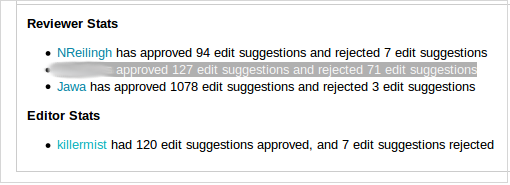Assuming you are talking about this edit:
This is one reason why we have majority rule in the review queues.
Looking at the review in question the edit was useful in that you saved the question from being closed as a product recommendation and so in my opinion it should have been approved as the rest of the question is not particularly poor quality.
From the other side though I personally have a very similar rejection ratio. I hate edits that are pointless grammatical changes that don't benefit anyone or similar superficial edits.
Your edit was on the borderline though. It clearly saved the question from being closed as a product recommendation, but to an extent it does conflict with the wishes of the author. He was specifically asking for a tool and you changed it to ask for a general solution instead.
I would have accepted your edit, but mainly because it essentially "does no active harm" to the question and actually prevented it from being immediately closed. I had to actually look at how you rephrased it to see that it is in fact roughly equivalent, minus the product recommendation.
I don't see any harm with a high reject ratio though. We need more people rejecting the more minor and pointless edits that do nothing more than create churn on the front page or people gaming the edit rep you get by making pointless changes to tag wikis that add no real value.
While the user who rejected your edit may certainly be more discerning, all their recent rejects seem to align well with the set of canned reject reasons that are available. Most of their recent rejections are from new users who were trying to comment on answers when they lack the reputation, perfectly fine to reject IMO.
Considering the ratios of accepted edits I'd actually be looking closer at the other users who accepted your edit and asking if they are simply accepting everything but the absolute worst edits. 1000 accepts with only 3 rejects seems a lot like robo-reviewing to me.

